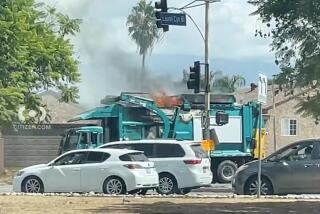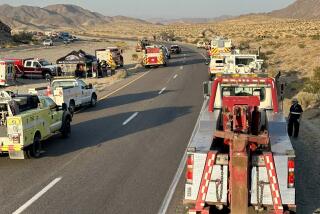Mishap Gives Freeway Crew a Sticky Task
- Share via
A sticky, icky, tar-like oil spill closed a downtown freeway interchange for 17 hours after a tanker-truck tipped over Sunday evening, dumping heavy crude oil onto a transition road from the Santa Monica Freeway to the southbound Harbor Freeway.
No one was injured, the California Highway Patrol reported, but an overnight SigAlert was called for the intersection when the heavy-grade crude oil cooled into a dense, tar-like substance as it oozed out of the truck’s second tank.
The truck was carrying about 3,500 gallons of the stuff when, according to CHP Sgt. Frank Kramer, it was “possibly . . . traveling a little too fast for the curve” from the westbound Santa Monica Freeway to the southbound Harbor Freeway just before 9 p.m. Sunday.
The tank tipped over and about 2,000 gallons of the oil eventually leaked onto the road, the CHP reported, creating a spill that filled both lanes of the ramp for about 200 feet down the road.
The tank was removed at about 10 a.m. Monday, Kramer said. A private company that handles hazardous materials had been summoned earlier, and spent hours steam blasting the patch of goo and then pushing it off to the side, where it was sucked into a collector tank.
Caltrans crews then sprayed the road with sand, and both the on-ramps and the adjacent Adams Boulevard exit, which had been closed, were reopened to drivers at about 2 p.m., the CHP said.
Traffic was not badly bollixed, in part because of what time the accident occurred, said Bob Polzin in Caltrans’ traffic operations center, which monitors the freeways’ 42-mile loop.
“Once they set up all the signs, closed down ramps and the connector . . . traffic wasn’t bad as long as they kept moving,” Polzin said.
“It was early enough in the morning that it really didn’t have a backup. People used to taking those routes had to find a new route,” but he said alternate routes and side streets “looked pretty good” to Caltrans monitors.
“Now, if it had happened during the commute hour,” he added, “we’d have a bigger problem.”
More to Read
Sign up for Essential California
The most important California stories and recommendations in your inbox every morning.
You may occasionally receive promotional content from the Los Angeles Times.












